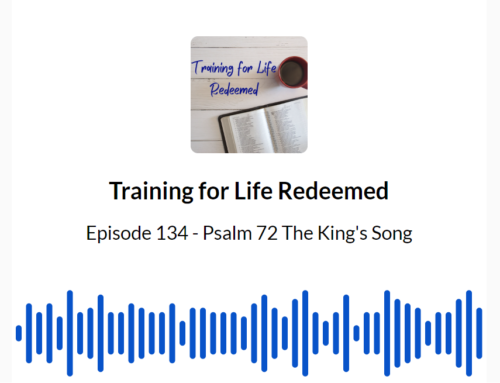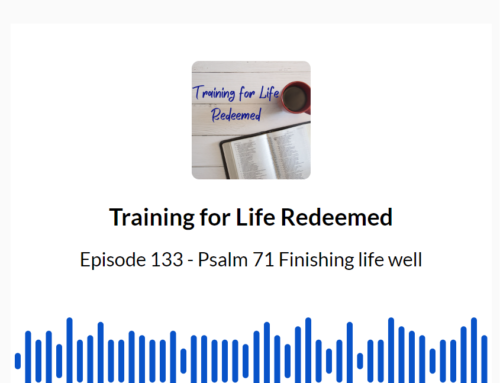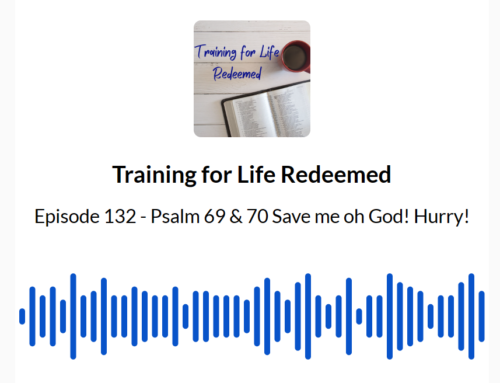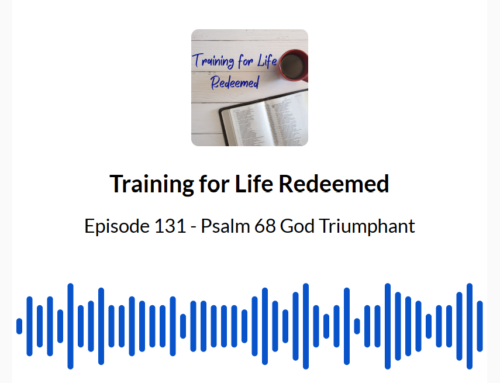The rejected brother, and the last of the unloved, are given a place at the front line of God’s plan of salvation through Jesus.
Grab your notes for this episode by completing the form
and we will send you the link to all our notes.
Transcript
Dan:
Hi, everyone. and welcome to trainingforliferedeemed. I’m your host, Dan, and as always, I’m here with my father, David Jackson. Hi dad. Today, we are looking at Joshua chapter 20 through to 22. There’s lots of descriptions in here, mostly have to do with the Levites and the cities the Levites get. And then there’s a particular special type of city called the cities of refuge. Can you explain those to us
David:
Cities, a refuge are fun. The cities of refuge law is set out in Numbers 35, and it just gives you , a way of running a country, running a society where you don’t have a king a nd where everything’s basically run from the ground up. So if your heart is right and you’re following the Lord and you’re following the book of instruction, you don’t really need, some big, heavy governmental infrastructure b ecause you’re going to do it out of love and you c an do i t o ut o f a sense of fairness and godliness a nd the way you you live. So what do you do if there’s an accident and somebody gets killed? T hat, t hat that’s, that’s the basic question and accidents do happen. S o you think o f the guy who’s o ut chopping wood. The head comes off his ax it’s buried in your uncle, Fred’s head and he’s dead. And your first instinct is go and find the guy and bash his head in That’s not a society that’s going to survive. that’s not a j ust society. It’s not a fair society. So God wants to teach us this concept of… This is really hard justice and grace. How do you put justice with grace. I think evangelical Christians are good at doing grace. We’re all into redeeming and rehabilitating and rescuing, but we sort of forget about the justice thing. I have sort of been looking at that during the week. Y ou k now, when we, we forget that God, Jesus a sked God, the father, p lease, is there any other way than the cross? And the father said, no, I can’t save anybody. If we don’t do justice, the sin must be punished. So what do you do if it’s an accident? So this, you have this, it’s a series of f oot r aces. Let’s set up some cities. And if the guy who accidentally killed somebody can get to one of those cities, he’ll be safe, that’s a foot race, but it’s a foot race where I had an accident. Nobody saw what happened. My friend got killed. It wasn’t deliberate. I could lie about it. And say I knew nothing about it, or I could admit and tell people what happened and God wants the truth. The truth will set you free. So, okay. I know what happened. I head for the city of refuge. I get to the city of refuge and I’m hoping the other fella’s relatives don’t get there before me because they could kill me on the way there cause blood. If, if somebody dies blood is shed that we get to the city of refuge and there’s an inquiry, we’ve actually set up, got us set up here, a court system that is based on eyewitnesses . It’s based on truth. And it’s a search for truth, not a contest. So we get to the city, we tell the story, we pull in the witnesses. If it was deliberate, they take the guy out and execute him. If it was an accident, he stays in the city of refuge and no one can touch him . And as long as you’re in that city of refuge, you’re safe. So, you know, we would put a , put an ox in place of the murderer, but we wouldn’t kill the guy. Cause he’s not a murderer. It was an accident. Well, he stays there until the year of Jubilee or until the high priest dies. So every 50 years we blow a trumpet and every, all the debts are cancelled. All the high price dies. And that it’s basically saying your safe place. Your city of refuge is Jesus. As long as you’re in him, the judgment doesn’t fall on you. And at his time when he blows the trumpet, we’re free. When the high priest dies, Jesus, you’re free. And we’re going to rehearse that with this city. Now, if you really are a murderer and you did do it, deliberately justice is coming , but we’re , we’re not leaving it to sort of tribal payback, which without a king and without a government, that’s what it would be. This, this, this city of refuge thing actually sets us up for civilized society. And it’s been a great, this whole system is the basis of our, our court system. We’ve sort of wandered away from two or three witnesses and we’ve sort of wandered away from justice towards rehabilitation, but the sense of it is there.
Dan:
Okay? So the cities of a refuge, very closely linked with Jesus being our refuge. It’s still saving us from God’s wrath instead of the human wrath of course, a bit of both, I guess we move on then to the other cities that the Levites are getting. So there’s other cities that Levites are being given. Why are they down in Jerusalem? The tabernacle, the temple , it’s not quite the temple yet, but eventually it will be the temple. Why are they just living down there? Isn’t that where they’re meant to be serving around the , the tabernacle and then the temple being with God?
David:
Yeah, it’s a it’s h e’s given them 48 cities scattered throughout the 12 tribal areas. So it’s going to be a long commute to get to work when you’ve got to go down and work at the tabernacle. And I think when you read on, later on in Chronicles, you d iscover that all Levites are on a roster where each family goes down for two week period to the temple, and then they all go back to their city. And so t hat a sks, that raises the question one, what are they doing in t hese 48 cities? And why do we need 48 cities scattered among all 12 tribes? And the answer is these are the guys who are going to be teaching God’s word. So you’re effectively putting a whole m ass o f Bible teachers scattered evenly throughout Israel. And their job is to take the word of God, set up the courts, set up the, you know, the people where you can go and say, well, I don’t know what to do in this situation open the Bible show me what to do. It’s the center of scholarship. It’s the center of settling disputes. And it’s, it’s the place where we start to teach the next generation, the word of God. So these are your teachers, your administrators, u m, your advisors, all those sorts of things. And part of the thing that the Levites do is they also do the music. So they’re the musicians. They’re the ones who take care of the health issues. They decide whether you’re sick or you’re not sick, whether you should go down to the temple or not go down to the temporal tabernacle, they’re administering all of this stuff so that everybody else can go out and run their farms. So you guys go o ut and do all your farming and we’ll take care of this stuff. So they’re freed from having to work the land. T hey can stay in the city, in the office, in the classroom and do that sort of stuff. And God has said, you know, my word is central to the whole thing. My word will be accessible to every one of the 12 tribes. That’s a pretty key thing.
Dan:
Yeah, no , it sounds very important. I think for Israel and how well they do it, you know , definitely as we get into the stories that come out of Levites who move places and do some very strange things that leads us into, we’re starting a civil war over an altar in chapter 22. Why are we starting a civil war over an altar arent these tribes outside of the promised land? Anyway, like you got two things. Why are we fighting over an altar ?
David:
I think one of the things, when you look at the Psalm says how blessed it is when brothers dwell together in unity and right in the middle of where the brothers dwell together in unity. There’s 12 brothers is the great rift valley with the Jordan river, running down the middle of it, got this huge gash in the earth. And you’ve got three tribes on one side and everybody else on the other and anybody with half a brain looks at that and says, how are we going to keep the family together when we’re living apart? I mean, I mean, you guys live on one side of the river. We live on the other side of the river. How do you keep the family together when there’s a river in the way? well, the guys on the Eastern side thought, you know what? The guys on the Western are sort of the majority and because we don’t live where they live, they’re going to tell us we’re not part of Israel. So they set up this rock monument to remind everybody that we’re one nation. This is where we crossed the river with you and our army fought to give you your land. So don’t tell us we don’t belong to the family. So that that’s all cool. That’s what they’re thinking. But the guys on the Western side of the river are looking at it, going, hang on a minute. There’s only one, God, there’s only one place where you sacrifice. What’s the second order . You’ve got a second God they’re heretics. Let’s go to war. And so the it’s a misunderstanding in the family, but at the heart of it, there they could have gone to war. If these guys were setting up a second altar , if it was a sacrificial altar , if you could find a second way to get your sins forgiven, other than where God was. So Yahweh is in his house and he’s older is in front of his house. If you’re going to set up another altar. Yahweh’s not there. So what God are you worshiping that would split the family. And that would bring down God’s judgment. And so they’re scared. So it’s a lovely little scene where every, or a family misunderstanding on that scale sorted out and everybody goes, oh, wow, you’re actually keen to be doing the right thing. And it holds 12 tribes together, even though there’s this big obstacle there in the middle.
Dan:
Okay. Well, that makes sense to me. And if you are listening to this, if you would like to grab the study notes to go along with this episode, please head over to trainingforliferedeemed.com/46. That I presume that these notes have the same little cartoon drawings in it that show the cities of refuge and the guy running to them being chased . Right ? You want to see that cartoon make sure you get those study notes. And if you enjoy this episode, please make sure \you leave us a review. We would love to hear from you and make sure you subscribe. So you can come back next week for our last episode on Joshua, as we finish it up and do Joshua 23 to 24. Thanks so much.



